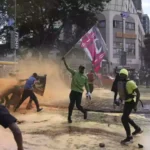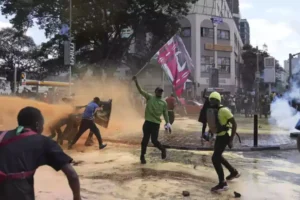The expansive space called the Eagle Square in Nigeria’s capital city Abuja is set for the inauguration of former Lagos State Governor, Bola Tinubu as Nigeria’s President for the next four years.
Beautifully decorated with the green-white-green colours of the nation, last-minute preparations are already being concluded for the historic handover of President Muhammadu Buhari to his party man who won the February 25 presidential poll.
Already, there is heavy security at the venue for the auspicious and remarkable event where Tinubu, 71, will be sworn in as Nigeria’s next leader after Buhari’s eight-year administration.
Scores of operatives of the joint security team comprising the Department of State Services, the Nigeria Police Force, the Nigerian Army and other paramilitary agencies were seen at the venue on Sunday evening. Fully armed, law enforcement agents were seen with different breeds of sniffer dogs in preparation for the main moment.
Scores of patrol vans have also been strategically positioned in and around Eagle Square with aerial and ground surveillance being discreetly carried out by security agencies.
‘100% Ready’
Speaking with Channels Television inside the Eagle Square on Sunday, the Secretary to the Government of the Federation, Boss Mustapha expressed confidence for a “seamless transition” on Monday.
The Inspector General of Police, Usman Baba, who inspected the readiness of his men at the venue said “We are prepared 100%” and will improve on preparation for crowd control.
Tinubu, the President-Elect and candidate of the ruling All Progressives Congress (APC) in the keenly contested February poll will be inaugurated alongside the Vice-President-Elect, Kashim Shettima.
The Chief Justice of Nigeria, Justice Olukayode Ariwoola is expected to administer the oath of office on Tinubu and Shettima in the presence of Buhari and his outgoing deputy, Vice-President Yemi Osinbajo.
Days earlier, Buhari showed Tinubu around the Aso Villa, Nigeria’s presidential residence while Osinbajo took Shettima on a tour of the Vice President wing of the Villa also known as the Aso Rock.
Also, Tinubu had on Thursday received transition documents from Buhari ahead of the May 29 inauguration just as Buhari conferred the national honours of Grand Commander of the Federal Republic (GCFR) and Grand Commander of the Order of Niger (GCON) on Tinubu and Shettima respectively.

Tinubu’s Long Walk To Aso Rock
With the baton about to be passed to Tinubu in a matter of hours, the former Lagos State governor would remember how he first declared his “lifelong presidential ambition” right in the same Aso Rock on January 10, 2022, during a visit to Buhari.

Tinubu’s walk to victory was without thorns as the APC powerbroker had to negotiate many slippery bends and contend many battles within and outside the APC.
To earn his party’s ticket for the race, he had to contend with heavyweights and partymen such as Vice-President Yemi Osinbajo, Senate President Ahmad Lawan and former Transportation Minister, Rotimi Amaechi, among others to win his party’s ticket. It took a strategic alliance with northern governors of states historically known for high voter numerical strengths including Kano, Jigawa, Sokoto, and Plateau, among others for him to defeat Amaechi and Osinbajo.
After the primary, being a Muslim, his choice of Shettima, another Muslim and former governor of Borno State, sparked outrage and drew strong criticism.
Questions about his health were constant throughout the campaign and there were allegations of crime and corruption, claims which he and his team repeatedly denied.

Frustrated with the seeming lack of support from the President and reported opposition by key members of the Presidency, he would go on to make his now famous “Emi lo kan (It is my turn)” speech on June 2, 2022.
“It is the turn of Yoruba, it is my turn,” he said while addressing party delegates at the Presidential Lodge in Abeokuta, Ogun State.
In the speech, he narrated how Buhari lost presidential elections repeatedly until he (Tinubu) helped him to win in 2015. He would later issue a statement declaring his respect for the President.

When the Naira redesign policy led to scarcity of the currency and outrage and protests by citizens, it was three APC governors, including Nasir El-Rufai of Kaduna and Yahaya Bello of Kogi that sued the Federal Government, seeking to prevent the full implementation of the policy.

At the poll, Tinubu came out tops in 12 of Nigeria’s 36 states and secured significant numbers in several other states to claim the highest number of votes — 8,794,726, almost two million votes more than his closest rival — former Vice President Atiku Abubakar of the Peoples Democratic Party (PDP).
Abubakar, 76, who has now run for president six times, got 6,984,520 votes, while the candidate of the Labour Party (LP), Peter Obi, who, in less than a year, galvanised young voters in a manner some have described as unprecedented finished the race with 6,101,533.
Both Atiku and Obi are in court challenging the victory of Tinubu and his declaration as the winner by the Independent National Electoral Commission.
Tinubu, who based his campaign on an 80-page manifesto which highlights an eight-point agenda, promised to be fair to all Nigerians.
“I promise Nigerians that the unity of this country is not negotiable. That is what Mike and I are promoting jointly. I promise I will be fair to all,” he said in Rivers State on May 4, 2023.
28 Governors To Be Sworn In
Also, the inauguration of 28 governors will take place across the nation today (Monday).
Of these new set of state leaders, 16 are members of the APC, 10 of the PDP, with the LP and the New Nigeria Peoples Party (NNPP) producing one each.
Seven re-elected governors of the APC will be inaugurated for second term. They include Babajide Sanwo-Olu (Lagos), Dapo Abiodun (Ogun), AbdulRahman AbdulRazaq (Kwara), Inuwa Yahaya (Gombe), Mai Mala Muni (Yobe), Abdullahi Sule (Nasarawa), Babagana Zulum (Borno).
The party also secured wins for eight nine candidates: Umar Namadi (Jigawa), Ahmed Aliyu (Sokoto), Dikko Radda (Katsina), Uba Sani (Kaduna), Bassey Otu (Cross River), Mohammed Bago (Niger), Hyacinth Alia (Benue), Francis Nwifuru (Ebonyi) and Nasiru Idris (Kebbi).
On the other hand, three re-elected PDP governors will be inaugurated. They are Seyi Makinde (Oyo), Bala Mohammed (Bauchi) and Aminu Tambuwal (Sokoto).
Seven first-term governors were also elected on the platform of the opposition party. They are Peter Mbah (Enugu), Umo Eno (Akwa Ibom), Siminialayi Fubara (Rivers), Kefas Agbu (Taraba), Caleb Mutfwang (Plateau), and Sheriff Oborevwori (Delta).
In a historic win, PDP’s Dauda Lawal unseated Zamfara State Governor and APC powerbroker in Zamfara, Bello Matawalle.
In a similar fashion, Abba Kabir of the NNPP unseated the APC in Kano State while LP’s Alex Otti won Abia which had been a PDP state in the last couple of years.
Source: Channels TV
















